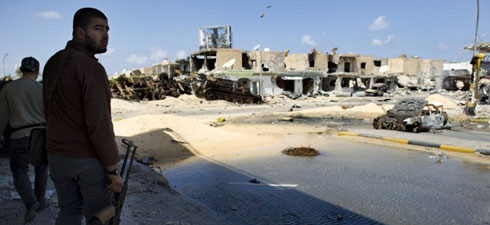The 20 British and French [and Italian] military advisers being sent to help the rebels in Benghazi do not constitute an occupation force. They are advisers rather than trainers, but they are boots on the ground. With every step being taken by those boots, Nato's military involvement in the civil war in Libya is deepening. Just as significant was the extension of Nato's target list to include Gaddafi's telephone exchanges and small satellite communications systems, which have ominously been labelled dual-use.
The announcements in London and Brussels this week were the third shift since the UN resolution authorised a no-fly zone over Libya. The others were the decision to send body armour to the rebels, and Barack Obama putting his name to a letter which said there was no future for Libya with Gaddafi in power. The war aims, which Mr Obama had earlier vowed would not be broadened to include regime change, had just got broader.
Each step has fuelled fears of mission creep, although, as one observer said, preventing the mission from collapsing altogether may be closer to the mark. Each of these steps is cumulative, and the direction of travel should concern us all. A month ago it appeared to some that Gaddafi's forces would fold like a pack of cards shortly after the first Tomahawks flew over. However, in many instances the opposite has happened. They have adapted to the urban battlefield, hidden their heavy weapons underground, put snipers on the rooftops of Misrata and shelled rebel-held areas with cluster bombs. Their missile launchers are no longer sitting ducks.
Nato officials said yesterday that strikes on a communications centre of Gaddafi's crack 32nd brigade had reduced the regime's ability to direct its forces on Brega and Ajdabiya. But at the same time they had to admit that strikes such as these had little effect on the street-to-street fighting in Misrata, which the Canadian commander of the air campaign, Lieutenant-General Charles Bouchard, likened to a knife fight in a phone booth – it was difficult to get into the middle of it. In other words, an intervention conducted in the name of protecting civilian life in Benghazi may have had the opposite effect in Misrata, Ras Lanuf, Brega and Ajdabiya.
Misrata could well become the turning point. It is the place where the aims of protecting the lives of non-combatants and advancing the war aims of one set of combatants have become fused and are now indistinguishable from one another. As the fighting continues, the symbolic effect of Nato's moves has also diminished. A month ago they might have been catalysts to those around Gaddafi who had no wish to be on the losing side. But today their psychological effect is not so obvious. Gaddafi is hardly quaking in his boots. If he were, his forces might have disengaged. Instead the fighting is spreading, and he may think he still has every hope of capturing Misrata. If that were to happen, he would have stopped the armed rebellion in its tracks.
There are now two options: digging in for the long haul in the expectation that the rebels will one day become a fighting force. This would mean that the steps we have seen would not be the last, as Nato ratchets up its presence in the air and on the ground. The second option is to go back to pursuing a diplomatic initiative of the type proposed by the African Union or Turkey. As the balance of power now stands, one or other of the Gaddafi clan might well remain in power.
Neither option is appealing, but from the logic of the UN resolution it is surely the second route that would stop the suffering of civilians sooner. To the rebels in Benghazi, Gaddafi's son Saif has shed his role as the public face of human rights reform. He has become as unacceptable as any other member of the Gaddafi clan. And yet in the absence of the collapse of the regime, he may end up as the face diplomats have to deal with.
Was this article useful? If so we are delighted!
It is freely available because we believe that the right to free and independent information is essential for democracy. But this right is not guaranteed forever, and independence comes at a cost. We need your support in order to continue publishing independent, multilingual news for all Europeans.
Discover our subscription offers and their exclusive benefits and become a member of our community now!












